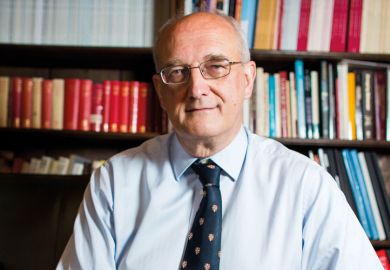The University of Cambridge would warn against any move to raise fees above £9,000 as a threat to access for poorer students. That was one of the key messages from Times Higher Education’s interview with the Cambridge vice-chancellor, Sir Leszek Borysiewicz.
He laid to rest any idea that Cambridge might be considering “going private” if it can’t charge higher fees (although he did say something interesting here about admissions that I didn’t have room for in the interview write-up – more on that in a bit).
And he told me that the university’s wealth means it can afford to cover the gap between the £9,000 fee and its real cost of undergraduate education (which the institution puts at £16,700).
His comments will be surprising and refreshing, to some. But perhaps they shouldn’t be. Perhaps the grouping together of Cambridge with the University of Oxford as “Oxbridge” – understandable in many ways but which Borysiewicz criticised – is obscuring some important differences between the two on big political issues such as fees.
Vince Cable, when he was business secretary, threw some grist in the fees conspiracy theory mill in comments made last year. He said he would be “very reluctant” to see any rise in fees. “The people who are asking for this, it’s really Oxbridge,” he added, summing up a common belief that the two universities speak as one on fees. The Oxford vice-chancellor, Andrew Hamilton, has indeed called for higher fees.
But the difference between Cambridge and Oxford on fees was clear in the former’s submission to the Browne review as far back as 2010, when it warned against scrapping teaching grant and raising fees, as well as in Borysiewicz’s comments.
If there are political differences between Cambridge and Oxford – it seems that there are in some policy – and you wanted to put them into really deep historical context, you might go back to the English Civil War, when the former backed Cromwell and the latter was royalist (although I couldn’t give you a definitive answer on what Cromwell would have thought of tuition fees).
Given that Cambridge competes internationally with even better funded institutions in the US, could that ever amount to a pressure where it changes its relationship with the UK state – or “goes private” in simplified terms? I put that question to Borysiewicz.
“It’s a good question. At this point, I’d say there is no pressure here at all,” he replied.
He then talked about the large numbers of students applying to Cambridge and the high academic standards.
“Our capacity to choose the students who we believe can benefit best from the type of education we provide is in large part determined by academic performance,” he said.
“So for me, the fact that we have the autonomy to be able to make those choices on how it works means we’re not under pressure, or do not have a reason to actually seek an alternative arrangement with government. Financially, that is not a consideration at the present time.”
I interpret that as a coded way of saying that Cambridge would only consider going private if a future government interfered unduly with its choice of which students to admit.
Borysiewicz also talked about the university’s £1 billion North West Cambridge development, currently in its first of three phases, which he described as important for the university’s “global competitiveness”.
Postgraduates and postdocs – for whom Cambridge competes against the Ivy League and other leading US institutions – are “the engine room of our research performance in the longer term”, he said. In a small city with expensive housing, the project offers a solution to the problem of finding accommodation. There will be 5,000 “accommodation units” for staff, postgraduates and postdocs, along with new academic space, and the university just opened a new school on the development.
When it comes to international competitiveness, there are far more pressing issues for Cambridge than undergraduate fees, it seems.
Borysiewicz’s comments on fees, and particularly his worries over linking a rise in line with inflation to the forthcoming teaching excellence framework, will be noted by the government.
It will be intriguing to see whether Oxford’s new vice-chancellor, Louise Richardson, alters the university’s stance on higher fees when she takes over from Hamilton in the New Year.
And whether, in contrast to some reticent “Oxbridge” vice-chancellors, she follows Borysiewicz’s example in speaking publicly on the big political issues for higher education.
Register to continue
Why register?
- Registration is free and only takes a moment
- Once registered, you can read 3 articles a month
- Sign up for our newsletter
Subscribe
Or subscribe for unlimited access to:
- Unlimited access to news, views, insights & reviews
- Digital editions
- Digital access to THE’s university and college rankings analysis
Already registered or a current subscriber?





